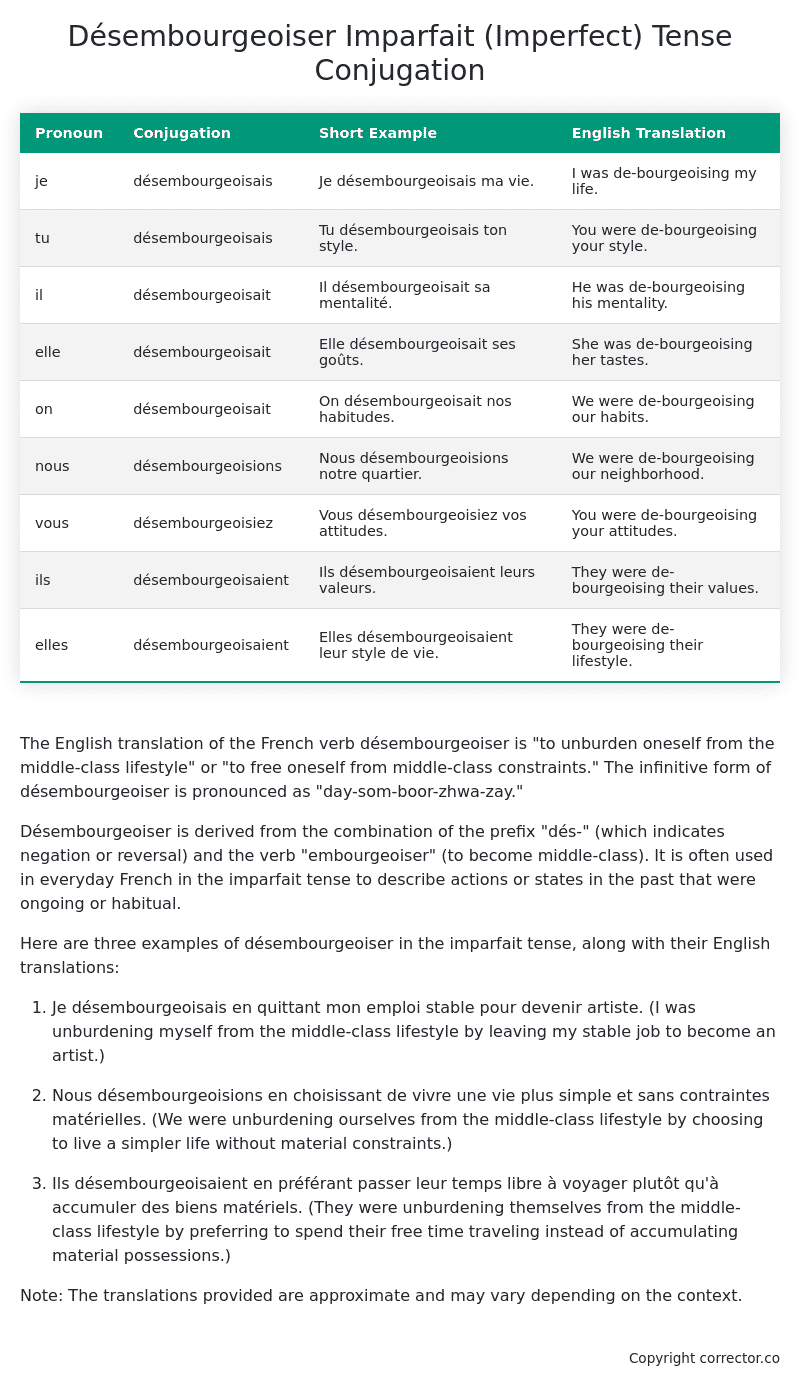Imparfait (Imperfect) Tense Conjugation of the French Verb désembourgeoiser
Introduction to the verb désembourgeoiser
The English translation of the French verb désembourgeoiser is “to unburden oneself from the middle-class lifestyle” or “to free oneself from middle-class constraints.” The infinitive form of désembourgeoiser is pronounced as “day-som-boor-zhwa-zay.”
Désembourgeoiser is derived from the combination of the prefix “dés-” (which indicates negation or reversal) and the verb “embourgeoiser” (to become middle-class). It is often used in everyday French in the imparfait tense to describe actions or states in the past that were ongoing or habitual.
Here are three examples of désembourgeoiser in the imparfait tense, along with their English translations:
-
Je désembourgeoisais en quittant mon emploi stable pour devenir artiste.
(I was unburdening myself from the middle-class lifestyle by leaving my stable job to become an artist.) -
Nous désembourgeoisions en choisissant de vivre une vie plus simple et sans contraintes matérielles.
(We were unburdening ourselves from the middle-class lifestyle by choosing to live a simpler life without material constraints.) -
Ils désembourgeoisaient en préférant passer leur temps libre à voyager plutôt qu’à accumuler des biens matériels.
(They were unburdening themselves from the middle-class lifestyle by preferring to spend their free time traveling instead of accumulating material possessions.)
Note: The translations provided are approximate and may vary depending on the context.
Table of the Imparfait (Imperfect) Tense Conjugation of désembourgeoiser
| Pronoun | Conjugation | Short Example | English Translation |
|---|---|---|---|
| je | désembourgeoisais | Je désembourgeoisais ma vie. | I was de-bourgeoising my life. |
| tu | désembourgeoisais | Tu désembourgeoisais ton style. | You were de-bourgeoising your style. |
| il | désembourgeoisait | Il désembourgeoisait sa mentalité. | He was de-bourgeoising his mentality. |
| elle | désembourgeoisait | Elle désembourgeoisait ses goûts. | She was de-bourgeoising her tastes. |
| on | désembourgeoisait | On désembourgeoisait nos habitudes. | We were de-bourgeoising our habits. |
| nous | désembourgeoisions | Nous désembourgeoisions notre quartier. | We were de-bourgeoising our neighborhood. |
| vous | désembourgeoisiez | Vous désembourgeoisiez vos attitudes. | You were de-bourgeoising your attitudes. |
| ils | désembourgeoisaient | Ils désembourgeoisaient leurs valeurs. | They were de-bourgeoising their values. |
| elles | désembourgeoisaient | Elles désembourgeoisaient leur style de vie. | They were de-bourgeoising their lifestyle. |
Other Conjugations for Désembourgeoiser.
Le Present (Present Tense) Conjugation of the French Verb désembourgeoiser
Imparfait (Imperfect) Tense Conjugation of the French Verb désembourgeoiser (You’re reading it right now!)
Passé Simple (Simple Past) Tense Conjugation of the French Verb désembourgeoiser
Passé Composé (Present Perfect) Tense Conjugation of the French Verb désembourgeoiser
Futur Simple (Simple Future) Tense Conjugation of the French Verb désembourgeoiser
Futur Proche (Near Future) Tense Conjugation of the French Verb désembourgeoiser
Plus-que-parfait (Pluperfect) Tense Conjugation of the French Verb désembourgeoiser
Passé Antérieur (Past Anterior) Tense Conjugation of the French Verb désembourgeoiser
Futur Antérieur (Future Anterior) Tense Conjugation of the French Verb désembourgeoiser
Subjonctif Présent (Subjunctive Present) Tense Conjugation of the French Verb désembourgeoiser
Subjonctif Passé (Subjunctive Past) Tense Conjugation of the French Verb désembourgeoiser
Subjonctif Imparfait (Subjunctive Imperfect) Tense Conjugation of the French Verb désembourgeoiser
Conditionnel Présent (Conditional Present) Tense Conjugation of the French Verb désembourgeoiser
Conditionnel Passé (Conditional Past) Tense Conjugation of the French Verb désembourgeoiser
Conditionnel Passé II (Conditional Past II) Tense Conjugation of the French Verb désembourgeoiser
L’impératif Présent (Imperative Present) Tense Conjugation of the French Verb désembourgeoiser
L’impératif Passé (Imperative Past) Tense Conjugation of the French Verb désembourgeoiser
L’infinitif Présent (Infinitive Present) Tense Conjugation of the French Verb désembourgeoiser
L’infinitif Passé (Infinitive Past) Tense Conjugation of the French Verb désembourgeoiser
Le Participe Présent (Present Participle) Tense Conjugation of the French Verb désembourgeoiser
Le Participe Passé (Past Participle) Tense Conjugation of the French Verb désembourgeoiser
Struggling with French verbs or the language in general? Why not use our free French Grammar Checker – no registration required!
Get a FREE Download Study Sheet of this Conjugation 🔥
Simply right click the image below, click “save image” and get your free reference for the désembourgeoiser imparfait tense conjugation!

Désembourgeoiser – About the French Imparfait Tense
NOTE: To take a deep dive into all the French tenses then see our article on Mastering French Tense Conjugation.
Formation of the Imparfait Tense
For regular -er verbs:
For regular -ir verbs
For regular -re verbs
Common Everyday Usage Patterns
Description of Past Habits
Background Information
Mental and Emotional States
It’s employed to express emotions, thoughts, or physical sensations in the past. For example: “J’étais content quand il est arrivé.” (I was happy when he arrived.)
Ongoing Actions
Points to Note About the Imparfait Tense
Passé Composé vs. Imparfait
Conditional
Si Clauses
Narration
I hope you enjoyed this article on the verb désembourgeoiser. Still in a learning mood? Check out another TOTALLY random French verb imparfait conjugation!


